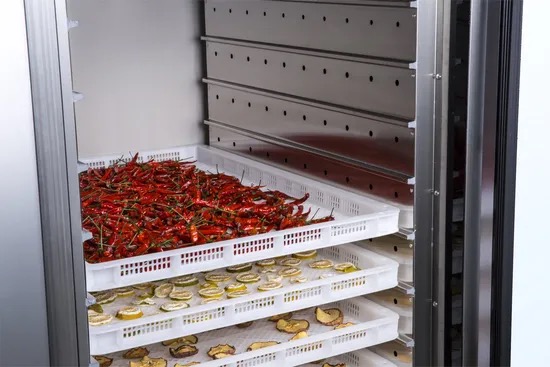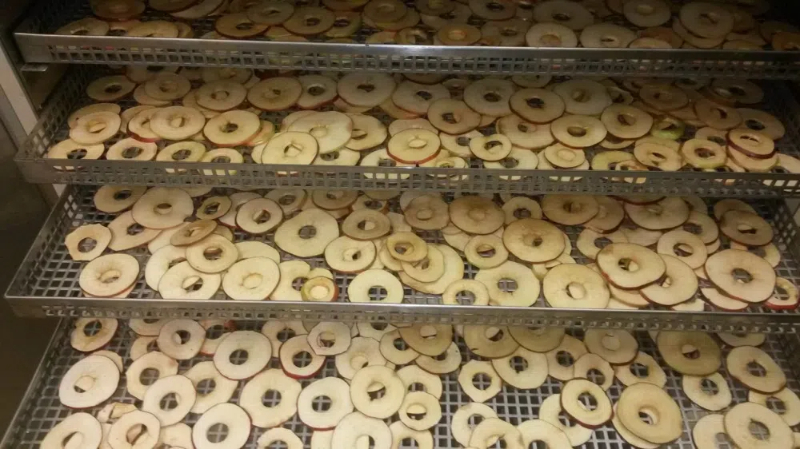
Content Menu
● Introduction to Food Drying
● What are Hang Type Drying Machines?
>> Key Features
● Advantages of Hang Type Drying Machines
● Applications in the Food Industry
● How Hang Type Drying Machines Work
● Types of Food Dryers
● Selecting the Right Hang Type Drying Machine
● Best Practices for Using Hang Type Drying Machines
● Future Trends in Food Drying Technology
● Conclusion
● FAQ
>> 1. What types of foods can be dried using hang type drying machines?
>> 2. How does temperature affect the drying process?
>> 3. Are hang type dryers energy efficient?
>> 4. Can these machines be used for batch processing?
>> 5. What maintenance is required for hang type drying machines?
● Citations:
Food drying is an essential process in the food industry, aimed at preserving food by removing moisture. Among the various drying technologies available, hang type drying machines stand out due to their efficiency and gentle handling of food products. This article explores the features, benefits, and applications of hang type drying machines, alongside a comprehensive overview of food dehydrators in general.

Introduction to Food Drying
Food drying is a technique used to extend the shelf life of food products by reducing their moisture content. This process inhibits the growth of microorganisms and enzymatic reactions that can lead to spoilage. Various methods exist for drying food, including sun drying, air drying, and mechanical drying. Among these, mechanical dryers like hang type drying machines are increasingly popular in commercial applications due to their controlled environment and efficiency.
What are Hang Type Drying Machines?
Hang type drying machines utilize a vertical hanging system for drying food items. These machines are designed to suspend products such as fruits, vegetables, meats, and herbs in a controlled environment where air circulation and temperature can be finely tuned.
Key Features
- Gentle Drying Process: The hanging method minimizes bruising and damage to delicate products.
- Controlled Environment: Users can adjust temperature and humidity levels to suit specific food types.
- Energy Efficiency: These machines often incorporate advanced technologies that reduce energy consumption while maintaining optimal drying conditions.
- Modular Design: Some models allow for customization based on the volume of product being dried, making them suitable for both small-scale and large-scale operations.
Advantages of Hang Type Drying Machines
1. Preservation of Nutritional Value: By controlling the drying process, these machines help retain vitamins and minerals that might be lost in traditional drying methods.
2. Versatility: Suitable for a wide range of products including fruits, vegetables, meats, and herbs.
3. Space Saving Design: The vertical arrangement allows for efficient use of space in production facilities.
4. Automated Systems: Many models come with automation features that enhance operational efficiency and consistency.
5. Reduced Risk of Contamination: The enclosed design minimizes exposure to contaminants from the environment.

Applications in the Food Industry
Hang type drying machines are utilized across various sectors within the food industry:
- Fruit and Vegetable Drying: Ideal for producing dried fruits and vegetables that retain their flavor and color. Commonly dried items include apples, bananas, tomatoes, and peppers.
- Herb Drying: Preserves essential oils and flavors in culinary herbs such as basil, thyme, and oregano. This is particularly important for maintaining the potency of herbs used in cooking.
- Meat Drying: Commonly used in jerky production where moisture removal is crucial for safety and shelf life. The controlled environment helps prevent spoilage while enhancing flavor.
- Seafood Drying: Fish and other seafood can also be dried using hang type machines, providing a method to create shelf-stable products like dried fish or shrimp.
How Hang Type Drying Machines Work
The operation of hang type drying machines involves several key steps:
1. Loading: Products are hung on racks or hooks inside the machine. This step is crucial as it determines how well air can circulate around each item.
2. Heating: The machine heats air which is circulated around the hanging products. The temperature is carefully monitored to ensure it remains within optimal ranges for each type of food.
3. Dehumidifying: Moist air is removed from the chamber to maintain low humidity levels. This step is vital for achieving effective moisture removal without compromising product quality.
4. Cooling: Once the desired moisture content is achieved, the product can be cooled before packaging. Cooling helps stabilize the product's structure and flavor.
Types of Food Dryers
In addition to hang type dryers, several other types of food dryers are commonly used:
| Type | Description | Applications |
| Belt Dryers | Use conveyor belts to move food through a heated tunnel | Continuous processing of bulk items |
| Bin Dryers | Large bins where hot air circulates around the product | Suitable for low moisture content |
| Freeze Dryers | Remove moisture by sublimation under vacuum conditions | Ideal for preserving delicate foods |
| Tray Dryers | Batch processing using trays stacked within a closed compartment | Small to moderate scale operations |
Selecting the Right Hang Type Drying Machine
When choosing a hang type drying machine for your business, consider the following factors:
1. Capacity Requirements: Assess how much product you need to dry at one time. Machines come in various sizes; selecting one that fits your production volume is crucial.
2. Temperature Control Options: Look for machines that offer precise temperature control suitable for different types of foods.
3. Energy Efficiency Ratings: Evaluate energy consumption rates to find a model that will save costs over time while meeting your production needs.
4. Maintenance Needs: Consider how easy it is to clean and maintain the machine; regular maintenance ensures longevity and consistent performance.
Best Practices for Using Hang Type Drying Machines
To maximize efficiency and product quality when using hang type dryers:
- Pre-Treat Foods When Necessary: Certain foods may benefit from pre-treatment (like blanching vegetables) before being placed in the dryer.
- Monitor Humidity Levels Regularly: Keeping an eye on humidity levels during operation ensures optimal conditions for drying.
- Rotate Products Periodically: If possible, rotate or reposition hanging items during the drying process to ensure even exposure to heat and airflow.
Future Trends in Food Drying Technology
As technology continues to evolve, several trends are emerging in food drying:
1. Smart Technology Integration: Many manufacturers are incorporating IoT (Internet of Things) capabilities into their dryers for remote monitoring and control.
2. Sustainability Focus: Increased emphasis on energy-efficient designs that reduce carbon footprints while maintaining high performance.
3. Enhanced Automation Features: More automated systems are being developed which streamline operations further reducing labor costs.
Conclusion
Hang type drying machines represent an innovative solution for preserving food quality while ensuring efficient moisture removal. Their gentle approach to drying makes them suitable for a variety of food products, contributing to enhanced flavor retention and nutritional value. As the demand for high-quality dried foods continues to rise, investing in advanced hang type drying technology becomes increasingly essential for businesses looking to stay competitive.

FAQ
1. What types of foods can be dried using hang type drying machines?
Hang type dryers are versatile and can effectively dry fruits, vegetables, meats, herbs, seafood, and even flowers.
2. How does temperature affect the drying process?
Temperature plays a crucial role; higher temperatures can speed up the process but may also degrade sensitive nutrients if not controlled properly.
3. Are hang type dryers energy efficient?
Yes, many modern hang type dryers are designed with energy-saving features that help reduce overall power consumption during operation.
4. Can these machines be used for batch processing?
While they are often used for continuous processes, hang type dryers can also accommodate batch processing depending on their design.
5. What maintenance is required for hang type drying machines?
Regular cleaning of components and checking for wear on mechanical parts are essential for maintaining optimal performance.
Citations:
[1] https://www.ike.cn/food-dehydrator.html
[2] https://patents.google.com/patent/CN110207480A/zh
[3] https://industrialdryers.com/food-dryers/
[4] https://patents.google.com/patent/CN109252340A/zh
[5] https://food-drying-machine.com/food-drying-equipment
[6] https://patents.google.com/patent/WO2017197612A1/zh
[7] https://ebooks.inflibnet.ac.in/ftp02/chapter/dryers-used-in-food-industry/
[8] https://patents.google.com/patent/CN1405396A/zh
[9] https://gcwgandhinagar.com/econtent/document/1588156026Unit%20V%20Types%20of%20dryers%20and%20their%20applications.pdf











